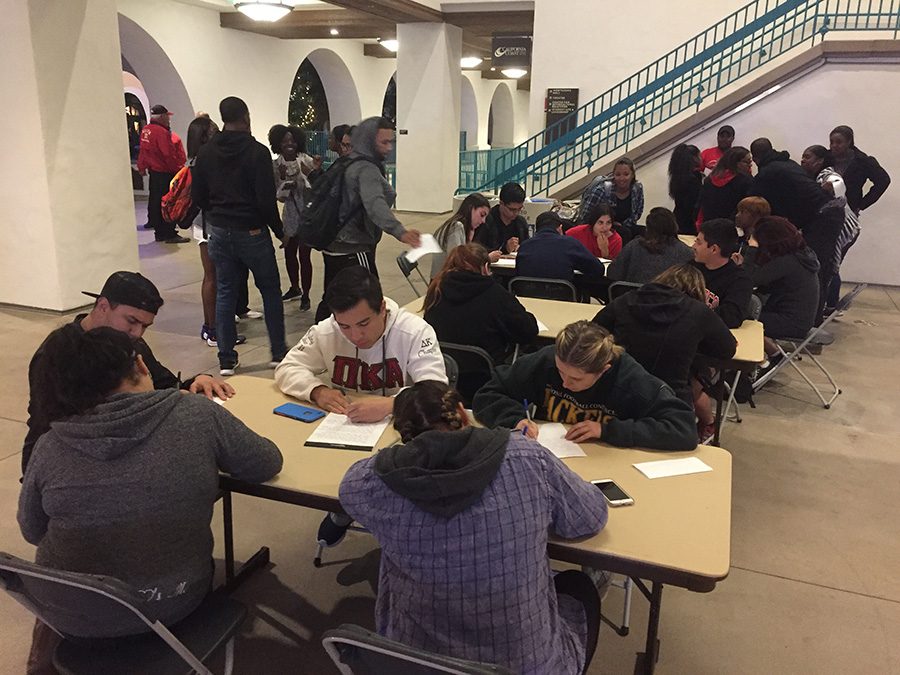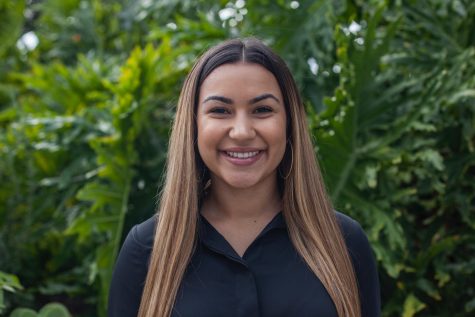Homecoming royals Taylor Lemker and Jason Ogbeide collaborated to host a service event titled Aztec Sleep Out, DeBunking the Stigma that attracted about 30 attendees on April 6.
The event took place from 10 p.m. to 3 a.m. in the Conrad Prebys Aztec Student Union Courtyard.
Ogbeide said his initial idea for the event was to focus on homelessness awareness and have students experience what it is like to sleep outside and be without access to food.
Lemker said she wanted to destigmatize mental illnesses and educate students on how to support those with them.
Lemker also said she wanted students to know that there are resources on campus that can help students with mental illnesses to be successful and live a good life.
Lemker said she and Ogbeide decided to put their ideas together.
“We figured that a lot of it has to do with ending stigmatization and learning how to not judge other people and have empathy for others that are unlike yourself,” she said.
The keynote speaker was Founder of the Free Hugs Project Ken Nwadike. The Project aims to inspire people to be peaceful and accepting of one another at places such as protests and rallies.
Nwadike spoke about his experience with homelessness and how he started the Free Hugs Project.
“Ken’s portion was everything I wanted it to be and more,” Ogbeide said. “He was able to answer all the questions in a way that made people really understand.”
During the talk, Nwadike said that he doesn’t remember the food or money he was given when he was homeless; he remembers the conversations and inspiration people gave him.
Liberal studies junior Nico Randolph said he was moved by Nadlike’s talk.
Randolph said he wants to be a counselor and help students the way Nwadike’s counselor helped him when he was growing up.
“For him, it was Miss Tuck. For me it was Mr. Jones. I want to be Mr. Randolph to somebody,” he said. “It is about the purpose, and that is something that I hold dear to my heart.”
Randolph said he understands that violence creates more violence.
“It takes one person to be like ‘no I don’t want to do this. I am going to be against the stereotype,’” Randolph said. “And like (Nwadike) said, he said I am not going to fulfill that stereotype of being an angry black man.”
Randolph said society has the idea that homeless people deserve their situations because of bad decisions.
He said people need to understand homelessness could happen to anyone.
“If I was homeless I would want someone to sit down and hear me out, especially when there are thousands of people walking past me,” he said.
The event also included a talk from 2013-14 Associated Students president Josh Morse about his experiences with homelessness and interdisciplinary studies junior Mariel McKinney about her experiences with mental health.
There were opportunities for students to put together hygiene kits for the homeless and write letters to future freshmen.
There was also a privilege walk and reflection.
Ogbeide led the privilege walk by asking the students attending the event about their experiences with mental illness, food insecurity and homelessness.
McKinney said she talked about ways to end the stigma behind mental health, gave advice for people dealing with mental health disorders and educated people on how to interact with those who have mental disorders.
“Society tells people not to talk about their mental health history and experiences,” she said. “I think it is empowering to share your story and show other people that they are not alone.”
Assistant Director of the Educational Opportunity Program and Ethnic Affairs Shareka White said the hygiene bags will be distributed to homeless in downtown San Diego.
She said any bags that are left over will be donated to a shelter and the SDSU Pride Center.
Ogbeide said he was disappointed by the turnout.
Lemker said she is proud of the student body for coming out to the event because there were no giveaways or free food.
“These people came out here because they want to better themselves and the San Diego State community,” she said.
She said she hopes students walked away from the event knowing that there are resources at SDSU to help them.
Lemker said she wants them to know there are people at SDSU who are willing to be there for them and accept them no matter what their background is or what challenges they face.
“I hope they feel more open to embracing people unlike themselves,” she said.









